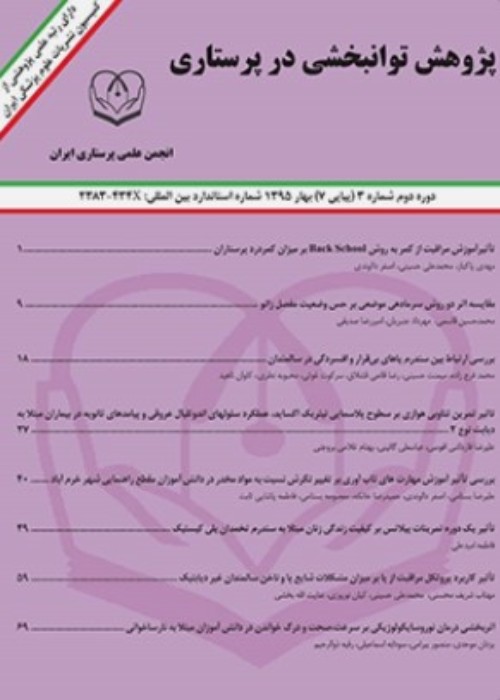Comparison of the effectiveness of Cognitive-Behavioral Therapy and Compassion- based therapy on self-care and glycosylated hemoglobin in diabetic patients
Diabetes is one of the chronic medical problems with a very rapid spread in the world. his disease is related to the increase in blood sugar in people. to control the blood sugar of patients, it is necessary to encourage them to self-care. This study aimed to compare the effectiveness of cognitive behavioral therapy and compassion-based therapy on self-care and glycosylated hemoglobin in diabetic patients.
This research was a semi-experimental study with a pre-test - post-test plan with a control group.
The statistical population consisted of diabetic patients who were members of the Hamedan Diabetes Association in 1400. 48 of these patients were selected by purposive sampling method and were divided into three groups by simple random method. The cognitive-behavioral therapy program and the compassion-based therapy program were implemented for 8 sessions (twice a week for 90 minutes) and the control group did not receive any intervention. Data collection tools included blood tests and self-care questionnaires. Data were analyzed using Spss-25 statistical software and multivariate covariance analysis method.
The results of this research showed that the compassion-based therapy compared to the Kuntzel treatment reduced glycosylated hemoglobin (P < 0.05) and increased self-care behaviors (P < 0.05). Also, there was a significant difference between the cognitive behavioral therapy and the control group. In the case of glycosylated hemoglobin and self-care behaviors, there was no difference in the post-test phase compared to the pre-test phase. The results of the Bonferroni test showed that the effect of compassion-based therapy on glycosylated hemoglobin and self-care behaviors is greater than that of cognitive-behavioral therapy (P < 0.01).
Conclussion:
The results of this research showed that compassion-based therapy was more effective than cognitive behavioral therapy in increasing self-care behaviors and improving glycosylated hemoglobin. According to the results of this research, therapists and health professionals can use compassion-based therapy to increase the physical and psychological recovery of diabetic patients. especially blood sugar control and increasing self-care behaviors.
- حق عضویت دریافتی صرف حمایت از نشریات عضو و نگهداری، تکمیل و توسعه مگیران میشود.
- پرداخت حق اشتراک و دانلود مقالات اجازه بازنشر آن در سایر رسانههای چاپی و دیجیتال را به کاربر نمیدهد.




